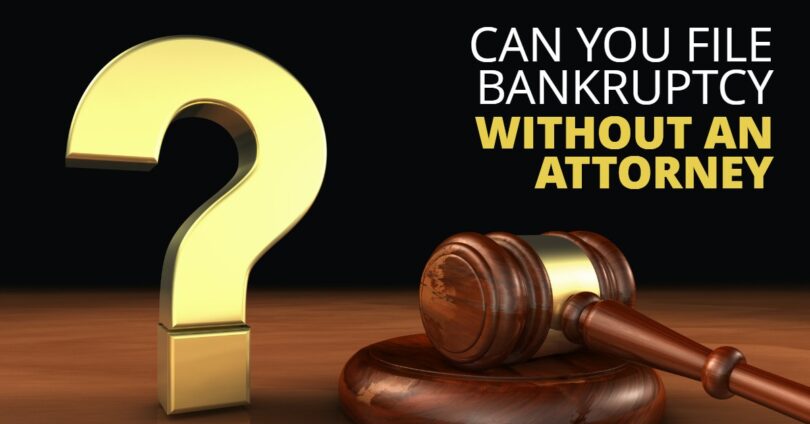Are you thinking about filing a Chapter 7 straight bankruptcy or a Chapter 13 payment plan case without a lawyer?
If you’re thinking about going it alone, you’re probably pretty strapped for cash, you’ve been spending some time researching the cost of filing a bankruptcy case, and you’re worried that you’re won’t be able to come up with the funds to hire someone to help you.
Before you decide to go it alone, there are some things you should think seriously about. This is not a decision to take lightly. If you make any missteps, you could end up worse off than you are now.
Here are some things you need to consider.
How Much Does it Really Cost to File Bankruptcy?
It’s true. To get quality representation, like most things, you’ll need to pay for it, unless you qualify for low cost services through a Legal Aid organization. But, before you jump to any conclusions, you may find that it’s more affordable than you think. Most consumer bankruptcy lawyers offer a free initial consultation. The attorney can help determine if you’re eligible for assistance through Legal Aid or through a pro bono program offered by a bar association near you. Your attorney can also offer you strategies for gathering the money if you don’t qualify for low-income assistance.
Keep in mind that what you’ll pay to file bankruptcy is so much less than you’ll pay if you continue to try to service your debts. And that’s not counting the stress, frustration, aggravation and years you’ll spend rehabilitating your credit. For more on how to afford a bankruptcy filing, check out our articles\
Can You Go It Alone?
So, no doubt you are wondering if you might actually be able to represent yourself in your bankruptcy case. It is certainly possible to do so. Some informal evidence suggests that pro se filers (those who file on their own) have no more difficulty successfully traversing the bankruptcy court — at least in Chapter 7 cases — than do filers who pay attorneys to handle their cases. In fact, one recent informal poll found that one out of nine bankruptcy cases is filed pro se (without the aid of an attorney).
There are so many factors that weigh on an important decision like filing a bankruptcy case on your own, and much depends on the complexity of the case. Here are a couple of things to think about that could affect your case and make it more difficult for you to manage on your own.
Your Property
It isn’t so much the debts you have that could cause issues, although they can be difficult if a creditor challenges whether or not the debt can be discharged. The real issue has to do with the type and the value of assets.
No debtor in bankruptcy is left with nothing at the end of a case. In every state, a debtor is allowed to keep a certain amount and value of assets needed to get a fresh start. These are called exemptions, and the amounts differ from state to state. They are called exemptions because the property is exempt from the reach of the court, the trustee and your creditors.
Exemptions work differently in Chapter 7 than in Chapter 13. If you file a Chapter 7 bankruptcy case while you own property that is not exempt, your trustee can take that property, sell it and use the money to pay your creditors some of what you owe them. If you have non-exempt property when you file a Chapter 13 payment plan case, the value of the assets could be added to your payment plan to increase your payments or the length of the plan.
If you don’t have much more than the furniture in your house and a car or two, you probably would not be required to give up any of your property, as long as you were careful to list everything you own and list it at a reasonable value. It is vital, however, that you know what exemptions are allowed in your state. Here’s a place to start:
Expect Increased Oversight by the Court
If it looks like you will not have any non-exempt assets, filing a Chapter 7 case is still a daunting task. Your trustee will no doubt take special interest in your case, if for no other reason than you make sure you have listed everything properly. You can expect that the trustee will ask you for additional documents, like copies of tax returns, house papers, car papers and bank account statements. Your Meeting of Creditors will probably take longer than for filers who are represented by attorneys just so that the trustee can do a thorough job of examining you under oath. For the same reason, your creditors will often look more carefully at your paperwork.
Keep in mind that the information you provide the court has to be complete and accurate. You will sign your paperwork under penalty of perjury and later have to testify as to its accuracy under oath. The consequences for lying are severe.
If you are willing to put up with that much scrutiny, you must still be mindful of the pitfalls you might encounter than can derail your attempt to go it alone unscathed.
Article reference:
https://www.thebalance.com/







